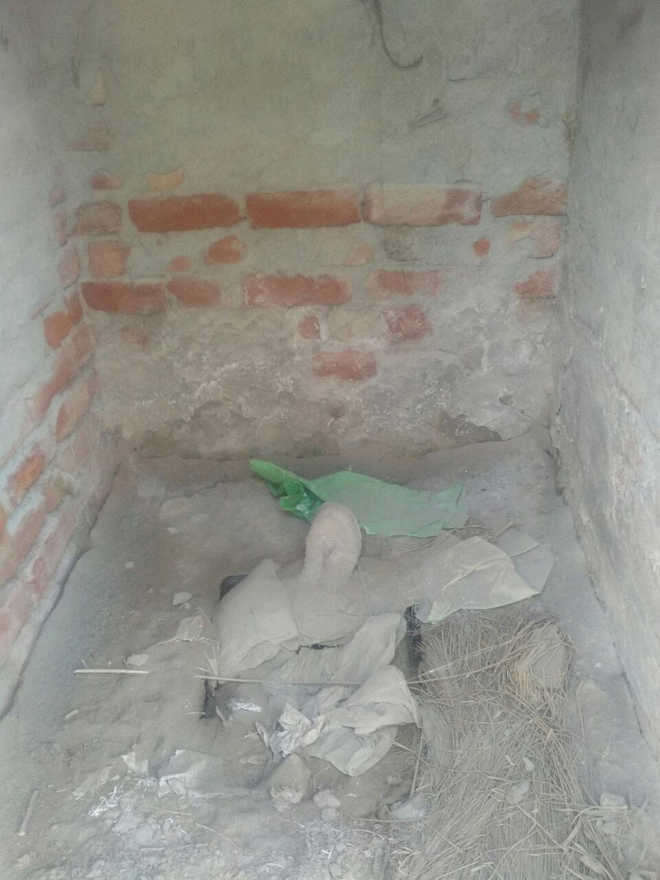
A brick enclosure without any toilet seat at Nindana Mumanpur village in Rohtak district. photo by the writer
Geetanjali Gayatri
Tribune News Service
Rohtak, February 23
In a district declared open defecation-free (ODF) by the Haryana Government last year, some families in the district’s Nindana village still don’t have access to toilets, taking the wind out of the sails of the Centre’s flagship Swachh Bharat Mission (SBM).
This is just not an ordinary village. Its claim to fame is on two counts — first, the village with four panchayats is the birthplace of Chief Minister Manohar Lal Khattar. Second, one of its panchayats, Nindana Khas, has been adopted by Railway Minister Suresh Prabhu.
In the Mamanpur panchayat of this “VIP village” which is part of the ODF bandwagon, 30-odd families have no access to toilets.
A government survey has brought out the village has 680 households and 598 toilets. In all, 52 toilets were constructed under the SBM. So, 30 households are forced to share toilets. Hence, the ODF status.
With the tag clinched, the families without toilets gradually went back to defecating in the open. By his own admission, Nindana Mumanpur sarpanch Jaswant says, “Still, there are 30 to 35 families without toilets. We are still an ODF village since we have common toilets at two places in the village for all such families and there is no open defecation.”
What he does not reveal is that “public toilets” are merely brick enclosures with no seats. Ask villagers and they say the ODF status was thrust upon them, though the surveyor knew there were some families with no toilets or access to them.
They say common toilets have been “under construction” for long and continue to be non-functional, but Nindana was declared ODF given the pressure to do so under the SBM.
Nanhi (55) says she has never used a toilet and doesn’t have one in her house. “We, all four members of my family, go in the open. The formality of the survey and the paperwork which was done before the village was declared ODF was a managed exercise and the sarpanch is party to it. Everybody knows how it all works,” she says.
ASHA worker Anita seconds her. In her house, a cramped brick enclosure next to the bathroom has been shown as a toilet in the papers. It only has a bed of hay for a base and wooden planks stored inside to shield them from the vagaries of the weather.
“The surveyor came, saw this and marked us as having a toilet. Most houses have toilets and it has become all the more embarrassing for the few deprived families to go in the open. We feel ashamed, but where is the option? Our voices remain confined to the village,” she says on behalf of others.
Aware of the need and urgency of having toilets, Santosh, living in a family of four, maintains politics of the village has deprived them of toilets since the sarpanch favours his chosen few and turns a blind eye to their plight.
“There are no toilets in homes of a number of families, but nobody is bothered. We are an ODF village and the matter stands closed. Nobody comes to check the ground reality,” she says, adding that such schemes end up confined to paper only.
Speaking on behalf of a group of women who rue the non-availability of a toilet, Santosh adds common toilets the sarpanch claims to have never been made functional. “Of course, the paperwork can be completed in the name of those toilets. If the surveyor had cared to independently check if the toilets were functional, if there was anything close to a toilet at these places, it would have been a different story,” she says.
The sarpanch claims the families without toilets deliberately refuse to use common toilets. “They want government assistance. This is the reason they claim to go in the open. It is all about money they can earn in the process,” Jaswant adds. Nevertheless, it remains a mystery how he sees toilets in enclosures of brickwalls stuffed with dry wood or cow dung cakes.



























